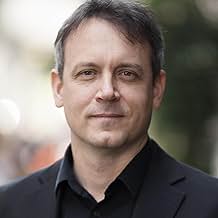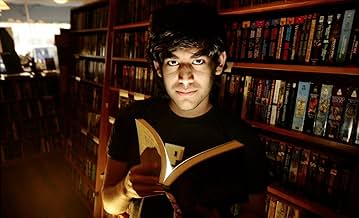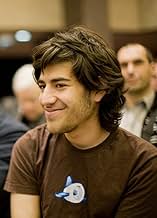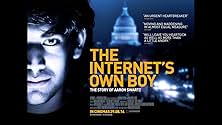La historia de Aaron Swartz. El chico de Internet
Título original: The Internet's Own Boy: The Story of Aaron Swartz
PUNTUACIÓN EN IMDb
8,0/10
18 mil
TU PUNTUACIÓN
Añade un argumento en tu idiomaThe story of programming prodigy and information activist Aaron Swartz, who took his own life at the age of 26.The story of programming prodigy and information activist Aaron Swartz, who took his own life at the age of 26.The story of programming prodigy and information activist Aaron Swartz, who took his own life at the age of 26.
- Dirección
- Guión
- Reparto principal
- Premios
- 4 premios y 4 nominaciones en total
Aaron Swartz
- Self
- (metraje de archivo)
Stephen Heymann
- Self - Asst. U.S. Attorney Massachusetts
- (metraje de archivo)
Reseñas destacadas
Orin Kerr, professor and former federal prosecutor, describes the motivation of the government's case as their fear that, as stated in his "Open Access Manifesto", Aaron believed it was a moral imperative to be committed to breaking the law to overcome a law that was unjust, and that, if allowed to succeed in "nullifying" the law, that everyone would have access to the data base and therefore "the toothpaste would be out of the tube" and somehow chaos would ensue, or as he phrases it, "Swartz's side would win". Apparently, free access to scholarly and scientific journals must be restricted to protect the people from themselves.
There is also the issue of civil disobedience in general and the ways those in power portray such actions and those who encourage them. As one other reviewer here states, "when you commit an act of criminal civic disobedience, you should do so accepting that you will most likely pay the price for that action". That is true, however, as Gilbert and Sullivan suggested, the punishment should fit the crime, especially when, as in this case, the "crime" is questionable at best. I wonder how the current US administration would view the acts of Gandhi or Mandela were they occurring now and posing a threat to their political status quo and not seen safely through the rear view mirror of history. It wasn't that long ago that many in power in America considered Mandela , in particular, a "terrorist".
This excellent documentary is a cautionary tale that all free thinking and well meaning people must see and understand. Secrecy is power and governments will do whatever they can to protect it. As Aaron himself suggested, this is a battle that will never be won, but can never be abandoned.
See this film.
There is also the issue of civil disobedience in general and the ways those in power portray such actions and those who encourage them. As one other reviewer here states, "when you commit an act of criminal civic disobedience, you should do so accepting that you will most likely pay the price for that action". That is true, however, as Gilbert and Sullivan suggested, the punishment should fit the crime, especially when, as in this case, the "crime" is questionable at best. I wonder how the current US administration would view the acts of Gandhi or Mandela were they occurring now and posing a threat to their political status quo and not seen safely through the rear view mirror of history. It wasn't that long ago that many in power in America considered Mandela , in particular, a "terrorist".
This excellent documentary is a cautionary tale that all free thinking and well meaning people must see and understand. Secrecy is power and governments will do whatever they can to protect it. As Aaron himself suggested, this is a battle that will never be won, but can never be abandoned.
See this film.
This non-fictional film documents the devastating and mortifying story of the the late Aaron Swartz and his battle with politics and the US justice system. It's heartwarming, funny, and tearful. You'll need to sit down to watch this one.
Anyone that uses computers should watch this film!
The film implied important questions:
1. Do computer users have any rights in the United States at all? If not, do the lawmakers not know enough about computers to make them?
2. Why do US Federal prosecutors threaten computer users when the "injured parties" state that they do not seek prosecution?
3. Why does a university like MIT not protect the fundamental rights of its students?
4. Isn't the primary role of a university to protect and nourish the fundamental rights of students before teaching can occur?
5. How much of Aaron's prosecution was based on legal precedent and how much of it was politically motivated?
6. Should any amount of politics be tolerable in a legal case where someone's life is on-the-line?
7. Why is the U.S. secret service prosecuting civilians in matters not related to national security?
I cannot begin to answer these questions by myself, but someone much smarter than me, like Aaron, may have been able to.
Computer experts have historically been blamed for the mistakes of others that did not know what they were doing with technology. Experts are threatened, scared into submission, and punished for the smallest infraction. Schools, governments, and everyday people are scared of computer experts and the power they command.
This movie leads one to believe that the nation's leaders are letting their fears control their decisions about technology instead of seeking out the experts and being open about their policies. This film covers all of this and more.
It most importantly serves as Aaron's story. Aaron is portrayed as a brilliant young computer expert that won't give up. It shows Aaron from a young age up until his last moments. His family, his friends, dreams and aspirations are all present. It shows his success at business and his genius. The filmmakers did an amazing job in making this beautiful film. This a tribute to Aaron's life and work.
I highly recommend watching this film.
Anyone that uses computers should watch this film!
The film implied important questions:
1. Do computer users have any rights in the United States at all? If not, do the lawmakers not know enough about computers to make them?
2. Why do US Federal prosecutors threaten computer users when the "injured parties" state that they do not seek prosecution?
3. Why does a university like MIT not protect the fundamental rights of its students?
4. Isn't the primary role of a university to protect and nourish the fundamental rights of students before teaching can occur?
5. How much of Aaron's prosecution was based on legal precedent and how much of it was politically motivated?
6. Should any amount of politics be tolerable in a legal case where someone's life is on-the-line?
7. Why is the U.S. secret service prosecuting civilians in matters not related to national security?
I cannot begin to answer these questions by myself, but someone much smarter than me, like Aaron, may have been able to.
Computer experts have historically been blamed for the mistakes of others that did not know what they were doing with technology. Experts are threatened, scared into submission, and punished for the smallest infraction. Schools, governments, and everyday people are scared of computer experts and the power they command.
This movie leads one to believe that the nation's leaders are letting their fears control their decisions about technology instead of seeking out the experts and being open about their policies. This film covers all of this and more.
It most importantly serves as Aaron's story. Aaron is portrayed as a brilliant young computer expert that won't give up. It shows Aaron from a young age up until his last moments. His family, his friends, dreams and aspirations are all present. It shows his success at business and his genius. The filmmakers did an amazing job in making this beautiful film. This a tribute to Aaron's life and work.
I highly recommend watching this film.
9xWRL
This warm yet chilling documentary retraces the life of Aaron Swartz, who committed suicide at age 26 after a couple of years of severe and deepening pressure from the criminal justice system, which was trying him for a number of felonies resulting from his breaking into MIT's computers.
We first see him as a young kid in home movies, then as a prodigy who while very young was brimming with new ideas for the Internet and applied genius-level programming skills to co-developing RSS and Reddit. Bored with college and with working for the business establishment, he turned to activism, promoting an open Web culture for the benefit of all users.
Swartz's activism turned into hacktivism, landing him in deep trouble with the Justice Department, which charged him with crimes that could have sent him to prison for 35 years. Touching, pointed accounts from family members and close associates describe what Aaron was like and how he responded to unyielding Justice Department efforts to use him as an example.
The interviews with law professor Lawrence Lessig and World Wide Web inventor Tim Berners-Lee are unforgettably moving. The film does a good job of calling into question Swartz's harsh treatment by the same Justice Department that shied away from prosecuting the big money interests that brought down our financial system.
Whether you sympathize with Swartz or not, the film does a solid job of showing how blind justice in the U.S. can be when it wants to be.
We first see him as a young kid in home movies, then as a prodigy who while very young was brimming with new ideas for the Internet and applied genius-level programming skills to co-developing RSS and Reddit. Bored with college and with working for the business establishment, he turned to activism, promoting an open Web culture for the benefit of all users.
Swartz's activism turned into hacktivism, landing him in deep trouble with the Justice Department, which charged him with crimes that could have sent him to prison for 35 years. Touching, pointed accounts from family members and close associates describe what Aaron was like and how he responded to unyielding Justice Department efforts to use him as an example.
The interviews with law professor Lawrence Lessig and World Wide Web inventor Tim Berners-Lee are unforgettably moving. The film does a good job of calling into question Swartz's harsh treatment by the same Justice Department that shied away from prosecuting the big money interests that brought down our financial system.
Whether you sympathize with Swartz or not, the film does a solid job of showing how blind justice in the U.S. can be when it wants to be.
When a documentary can illicit tears of both anger and sadness, you know it must be doing something right. Such is the case with The Internet's Own Boy: The Story of Aaron Swartz. Aaron Swartz was one of the co-founders of the internet's so called front page; Reddit. He was also one of the most outspoken and inspired activists fighting to keep the internet free, protecting the rights and privileges of the American people whose government was trying tirelessly to censor the free speech granted by the web. Tragically, he took his own life at the age of 26 due to the constant pressures and endless scrutiny and indictment placed onto him by the American government. This film chronicles his tragically short life and attempts to put Aaron's name out there for the sake of carrying on his legacy. There aren't a whole lot of documentaries or films in general out there that I would say it is crucial that you watch. However, The Internet's Own Boy is one of these films. It pulls back the curtain on one of the most significant and relevant issues of our modern era, which is fighting censorship and maintaining the ability to access and attain the necessities the internet grants us. For instance the film starts out by showing us Swartz's many hacking campaigns where he would obtain legal and court documents from the American courts that one would otherwise have to unfairly pay for, and making it free to the public. It shows Aaron's fight for people's right to information, something the government seems to be stopping at nothing to revoke. It's truly sickening to see the things that Aaron, his friends, and his colleagues are put through in their fight for such a just cause. There are parts of this film that are absolutely infuriating, and there are parts that inspire as much as the other moments enrage. The victorious battle against the SOPA bill, for instance, highlights one great victory that shows off the American people's ability to make change happen, and fight back against what they know is wrong. This film shows what civil disobedience, protest, and the aptly coined term "hacktivism" are capable of, but it also shows the ignorant unfairness of what the government is capable of as well. Hence the frustration. It highlights the absurd idiocracy of a system stuck in the past, one that literally bases its bylaws off of The Computer Fraud and Abuse Act written in the 1980's when computers were a brand new idea and the endless scope of the internet wasn't even a conceived notion yet. The Internet's Own Boy strikes at a lot of issues that so easily get swept under the rug, and urges all of its viewers to be conscious of our rights and whether or not they are being stripped from us, because it can happen right under our noses. It concedes to us that we can't settle for unfair censorship and we must continue to fight back against a system that wants to tie our hands behind our backs and put duct tape over our mouths. Yes, the story of Aaron Swartz is a very sad one, and the film strikes emotional chords that give a beautiful amount of weight to the story being told. But the goal of The Internet's Own Boy is not to sour our moods with the tragic story of one of the 21st century's greatest minds. It is to raise awareness of this war against censorship; a war that can and must be won. The relevance of the issue is too immediate and too vital to our free speech system to be ignored. If you use the internet, you must see The Internet's Own Boy, and you must help carry on Aaron Swartz's noble legacy.
The Internet's Own Boy was very well-received at its showing in Austin's SXSW Film Festival. The film is simultaneously a biography of the tragic death of internet pioneer Aaron Swartz and at the same time a fascinating history of the development of the online political movements that he devoted his life to. The film tells a fascinating story of young genius deeply involved in the early development of the internet including co-founding of Reddit. His genius is unquestionable. The film really provides a tribute to a talented young man and presents a strong case that he was unjustly and selectively prosecuted and overcharged by an overzealous prosecutor. This prosecution seems to have provoked his suicide.
But the film is unable to establish any real emotional distance from its subject in order to present an objective full picture of Aaron. Early scenes show home movie pictures of Aaron as an adorable precocious toddler playing with his brothers. From this beginning it is impossible to establish the emotional independence necessary to shine any sort of critical light on Aaron's life or activities. The interviews are all with his family, friends and supporters and don't really critique his efforts. He becomes a victim who despite his incredible genius seems to lose responsibility for his own actions including his own suicide. He becomes purely a victim of government persecution with no real responsibility for his own life decisions including his various hacking activities that ultimately lead to his arrest.
The film really presents Aaron Swartz as a modern-day martyr for the cause of an open access to the internet that he deeply believed in and dedicated himself to. Perhaps because of his recent and tragic death the filmmaker seems unwilling to question the ethics of Aaron's hacker-like tactics. There really aren't any voices raising serious questions about whether his efforts to take the law into his own hands by downloading millions of documents was truly an appropriate form of civil disobedience. He did, in fact, steal millions of articles and violate intellectual property rights through his actions. He undoubtedly believed that what he was doing was right and just.
The film is thus more of a tribute to his life and a critique of the criminal justice system than it is a balanced examination of his controversial history which deserves closer examination. The filmmaker seems to be too close to Aaron's legacy to present a truly objective self-critical examination of his legacy and his somewhat radical view of open access to knowledge and information. While it is easy to argue for that view, it overlooks the complexity of case for protecting intellectual property rights.
Ironically, Aaron seems more far impressive and righteous when he is fighting successfully to defeat the SOPA bill than when he is stealing copyrighted materials. This showed his remarkable ability to organize online and unify people in a collective action that made a real difference for the future of the internet. The tragedy is that this great young activist self-destructed. The filmmaker turns his heroism into victimization and I think may actually undermine his own effort to pay tribute to Aaron. The best tributes are those that are present a complete picture rather than build-up a myth. Never-the-less, despite its flaws this is a powerful and important film that is highly recommended to begin to understand who Aaron Swartz was and to learn about the important issues of intellectual freedom online that he devoted himself to.
But the film is unable to establish any real emotional distance from its subject in order to present an objective full picture of Aaron. Early scenes show home movie pictures of Aaron as an adorable precocious toddler playing with his brothers. From this beginning it is impossible to establish the emotional independence necessary to shine any sort of critical light on Aaron's life or activities. The interviews are all with his family, friends and supporters and don't really critique his efforts. He becomes a victim who despite his incredible genius seems to lose responsibility for his own actions including his own suicide. He becomes purely a victim of government persecution with no real responsibility for his own life decisions including his various hacking activities that ultimately lead to his arrest.
The film really presents Aaron Swartz as a modern-day martyr for the cause of an open access to the internet that he deeply believed in and dedicated himself to. Perhaps because of his recent and tragic death the filmmaker seems unwilling to question the ethics of Aaron's hacker-like tactics. There really aren't any voices raising serious questions about whether his efforts to take the law into his own hands by downloading millions of documents was truly an appropriate form of civil disobedience. He did, in fact, steal millions of articles and violate intellectual property rights through his actions. He undoubtedly believed that what he was doing was right and just.
The film is thus more of a tribute to his life and a critique of the criminal justice system than it is a balanced examination of his controversial history which deserves closer examination. The filmmaker seems to be too close to Aaron's legacy to present a truly objective self-critical examination of his legacy and his somewhat radical view of open access to knowledge and information. While it is easy to argue for that view, it overlooks the complexity of case for protecting intellectual property rights.
Ironically, Aaron seems more far impressive and righteous when he is fighting successfully to defeat the SOPA bill than when he is stealing copyrighted materials. This showed his remarkable ability to organize online and unify people in a collective action that made a real difference for the future of the internet. The tragedy is that this great young activist self-destructed. The filmmaker turns his heroism into victimization and I think may actually undermine his own effort to pay tribute to Aaron. The best tributes are those that are present a complete picture rather than build-up a myth. Never-the-less, despite its flaws this is a powerful and important film that is highly recommended to begin to understand who Aaron Swartz was and to learn about the important issues of intellectual freedom online that he devoted himself to.
¿Sabías que...?
- Citas
First Title Cards: Unjust Laws exist; shall we be content to obey them, or shall we edeavor to amend them, and obey them until we have suceeded, or shall we transgress them at once?- Henry David Thoreau
- ConexionesFeatures El mago de Oz (1939)
- Banda sonoraExtraordinary Machine
Written and Performed by Fiona Apple
Selecciones populares
Inicia sesión para calificar y añadir a tu lista para recibir recomendaciones personalizadas
- How long is The Internet's Own Boy: The Story of Aaron Swartz?Con tecnología de Alexa
Detalles
- Fecha de lanzamiento
- País de origen
- Sitio oficial
- Idioma
- Títulos en diferentes países
- The Internet's Own Boy: The Story of Aaron Swartz
- Empresas productoras
- Ver más compañías en los créditos en IMDbPro
Taquilla
- Recaudación en Estados Unidos y Canadá
- 48.911 US$
- Fin de semana de estreno en EE. UU. y Canadá
- 21.705 US$
- 29 jun 2014
- Recaudación en todo el mundo
- 48.911 US$
- Duración1 hora 45 minutos
- Color
- Relación de aspecto
- 1.78 : 1
Contribuir a esta página
Sugerir un cambio o añadir el contenido que falta

Principal laguna de datos
What is the Spanish language plot outline for La historia de Aaron Swartz. El chico de Internet (2014)?
Responde

























